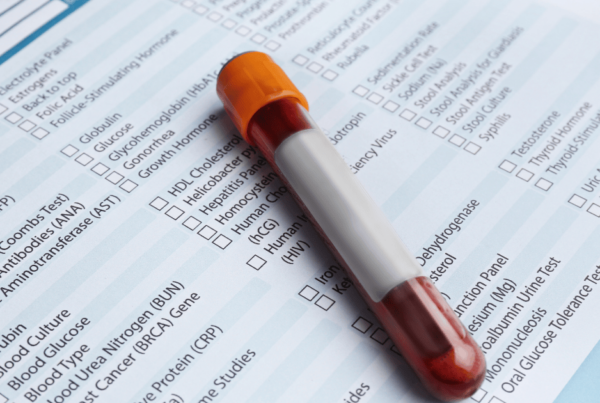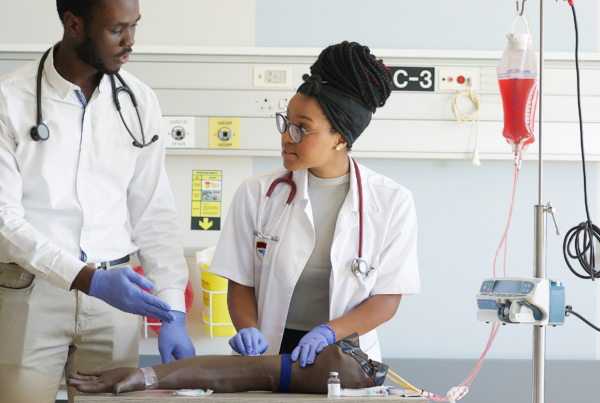If you’re considering a career in phlebotomy, you might be wondering, “how old to be phlebotomist?” Phlebotomy is an important healthcare profession that involves drawing blood for tests, transfusions, and donations. It requires a unique combination of skills, including attention to detail, precision, and the ability to put patients at ease. In this comprehensive guide, we’ll explore the age requirements for becoming a phlebotomist, the educational paths available, and what you can expect from a career in this field.
| Key Takeaways: How Old to Be a Phlebotomist? |
| Age Requirements: Most states require phlebotomists to be at least 18 years old, though some states allow younger individuals to start training under specific conditions. |
| Education: High school students should focus on science courses; post-secondary training programs are available at vocational schools, community colleges, and trade schools. |
| Certification: While not always required, certification can improve job prospects and demonstrate competence. |
| Career Paths: Phlebotomy offers entry-level positions with opportunities for specialization and advancement through continuing education. |
Understanding the Age Requirements for Phlebotomists
General Age Requirements
In the United States, most states require individuals to be at least 18 years old to work as a phlebotomist in hospitals, clinics, or other healthcare settings. This age requirement ensures that phlebotomists have the maturity and responsibility needed to handle medical procedures and interact with patients. So, how old to be phlebotomist? Generally, the minimum age is 18.
State-Specific Regulations
While the general age requirement is 18, some states have specific regulations that may allow younger individuals to start their training under certain conditions. Understanding how old to be phlebotomist in different states can help you plan your career path more effectively.
- California: In California, becoming a certified phlebotomy technician and working in a licensed healthcare facility requires you to be at least eighteen years old. If you are between the ages of 16 and 18, you can participate in a phlebotomy training program and work as a certified phlebotomy assistant under the direct supervision of a licensed healthcare professional.
- Other States: It’s important to check the specific requirements in your state, as they can vary. Some states might allow younger students to start training but with limitations on their work settings and responsibilities.
Educational Pathways to Becoming a Phlebotomist
High School Preparation
If you’re still in high school and interested in phlebotomy, focus on science courses such as biology and anatomy. These subjects will provide a solid foundation for your future studies. Knowing how old to be phlebotomist can guide your preparation during high school.
Phlebotomy Training Programs
Phlebotomy training programs are typically offered by vocational schools, community colleges, and trade schools. These programs vary in length but generally take a few months to complete. Here’s what you can expect:
- Admission Requirements: Most programs require applicants to have a high school diploma or GED. Some programs may also have age requirements, usually 18 years old, but there are exceptions. Make sure to confirm how old to be phlebotomist for the specific program you’re interested in.
- Coursework: Training programs cover various topics, including anatomy and physiology, blood collection techniques, safety protocols, and patient communication skills.
- Clinical Experience: Practical clinical experience is an essential component of training. Students practice blood draws on simulated arms and eventually on real patients under supervision.
Career Opportunities and Advancement
Entry-Level Positions
Once you complete your training and meet the age requirements, you can start working as an entry-level phlebotomist in various settings such as hospitals, clinics, blood donation centers, and laboratories. Your responsibilities will include drawing blood, preparing samples for testing, and maintaining patient records. Understanding how old to be phlebotomist ensures you’re ready to enter the workforce at the right time.
Certification
While certification is not required in all states, it can enhance your job prospects and demonstrate your competence. Organizations like the American Society for Clinical Pathology (ASCP) and the National Healthcareer Association (NHA) offer certification exams for phlebotomists. Knowing how old to be phlebotomist can also influence when you pursue certification.
Continuing Education and Specialization
As you gain experience, you may choose to specialize in areas such as pediatric phlebotomy or become a phlebotomy supervisor. Continuing education and additional certifications can open up more advanced career opportunities.
Breaking the Age Barrier in Phlebotomy
Young Aspirants
If you’re under 18 and passionate about phlebotomy, there are steps you can take to prepare for your future career:
- Education: Focus on your high school studies, particularly in science subjects.
- Volunteer Work: Gain experience by volunteering in healthcare settings. This can provide useful insights and help you develop related abilities.
- Research: Stay informed about the requirements in your state and plan your path accordingly.
Mature Career Changers
If you’re an older individual considering a career change to phlebotomy, you bring valuable life experience and maturity to the field. Here’s how to make the transition:
- Education and Training: Enroll in a phlebotomy training program to gain the necessary skills and knowledge.
- Certification: Obtain certification to enhance your credentials.
- Networking: Connect with professionals in the healthcare field to explore job opportunities and learn about industry trends.
The Importance of Certification
Certification, although not mandatory in all states, is highly recommended for aspiring phlebotomists. It not only enhances your employability but also demonstrates your competence and dedication to the profession. Here’s a closer look at the benefits of certification:
Enhanced Job Prospects
Certified phlebotomists often have better job prospects compared to their non-certified counterparts. Employers prefer hiring certified professionals because it assures them of the individual’s skills and knowledge.
Higher Earning Potential
Certification can also lead to higher earning potential. Certified phlebotomists are often eligible for higher pay rates and better job positions.
Professional Recognition
Earning a certification from a reputable organization such as the American Society for Clinical Pathology (ASCP), the National Healthcareer Association (NHA) or the American Registry of Phlebotomy Technicians provides professional recognition and credibility.
Continuing Education
Many certification programs require continuing education for renewal. This ensures that phlebotomists stay updated with the latest techniques, safety protocols, and advancements in the field.
Specializations in Phlebotomy
As you progress in your phlebotomy career, you might choose to specialize in certain areas. Specializations can provide more career opportunities and personal satisfaction. Here are a few areas you can specialize in:
Pediatric Phlebotomy
Working with children requires special skills and patience. Pediatric phlebotomists are trained to handle young patients, making the blood draw process as comfortable as possible for them.
Geriatric Phlebotomy
Geriatric phlebotomists specialize in working with elderly patients. This specialization requires an understanding of the unique challenges and needs of older adults.
Mobile Phlebotomy
Mobile phlebotomists travel to various locations to draw blood, such as patients’ homes, nursing homes, or community health events. This role requires flexibility and the ability to work independently.
Phlebotomy Supervisor
Gaining further training and experience will help you progress to a supervisory position. Phlebotomy supervisors oversee the work of other phlebotomists, manage laboratory operations, and ensure compliance with safety and quality standards.
Challenges and Rewards of a Phlebotomy Career
Every career comes with its challenges and rewards. Understanding these can help you prepare for what to expect in your phlebotomy career.
Challenges
- Emotional Stress: Working with patients who are anxious about needles or dealing with difficult medical situations can be emotionally taxing.
- Physical Demands: The job often requires standing for long periods and handling heavy equipment.
- Exposure to Health Risks: Phlebotomists are exposed to bloodborne pathogens and must follow strict safety protocols to minimize risks.
Rewards
- Helping Patients: One of the most rewarding aspects of being a phlebotomist is knowing that you are helping patients by providing essential diagnostic information.
- Job Stability: The healthcare field offers job stability and a steady demand for phlebotomists.
- Career Growth: With the potential for specialization and advancement, phlebotomy offers opportunities for career growth and development.
FAQs
Can I become a phlebotomist if I’m under 18?
In most states, you must be at least 18 years old to work as a phlebotomist. However, some states allow individuals as young as 16 to begin training under certain conditions and work in supervised roles. It’s essential to check how old to be phlebotomist in your specific state.
What kind of training is required to work as a phlebotomist?
You typically need a high school diploma or GED to enroll in a phlebotomy training program. These programs cover essential topics such as anatomy, blood collection techniques, and safety protocols.
Is certification necessary to work as a phlebotomist?
Certification is not required in all states but can enhance your job prospects and demonstrate your competence. It is highly recommended to pursue certification from recognized organizations like the ASCP or NHA.
What are the job prospects for phlebotomists?
Phlebotomists are in demand in various healthcare settings, including hospitals, clinics, blood donation centers, and laboratories. With experience and additional certifications, there are opportunities for specialization and advancement.
Can I change my career to phlebotomy later in life?
Absolutely! Phlebotomy is a viable career option for individuals of all ages. Mature individuals often bring valuable life experience and maturity to the profession.
Conclusion
The age requirement for becoming a phlebotomist varies depending on where you live and your level of education. Generally, you need to be at least 18 years old to work as a certified phlebotomist in a healthcare setting. However, with the right preparation and determination, individuals of all ages can pursue a fulfilling career in phlebotomy.
Whether you’re a young student planning your future, an adult looking to enter the healthcare field, or a mature individual seeking a career change, phlebotomy offers a rewarding path. By understanding the age requirements, educational pathways, and career opportunities, you can take the first step towards a successful career as a phlebotomist.
For more information and resources on becoming a phlebotomist, visit Phlebotomy Now School and start your journey today. Understanding how old to be phlebotomist is just the beginning of your exciting career path.
Ready to Start Your Journey Toward a Rewarding Career in Phlebotomy?
Phlebotomy Now School offers comprehensive training programs designed to equip you with the skills and knowledge you need to succeed.
Enroll today and take the first step towards becoming a skilled and certified phlebotomist. Remember, understanding how old to be phlebotomist is just the beginning of your exciting career path.


